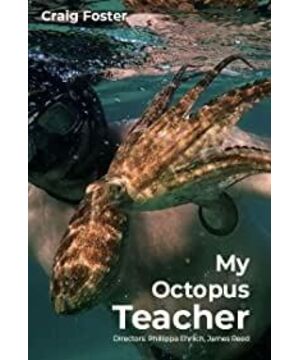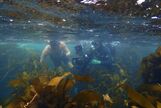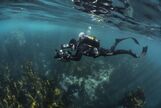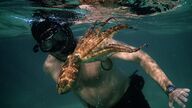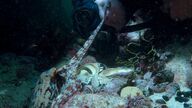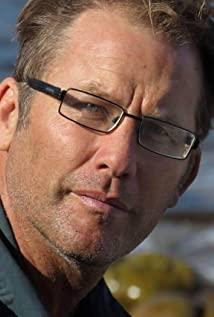"The warm sun shines on the deep blue and cold sea, and the little mermaid slowly rises, turns into large and small bubbles, and floats on the sea."
When I watch the documentary (My Octopus Teacher) "My Octopus Teacher", I unconsciously associate the film with Angerson's fairy tale "The Daughter of the Sea". This year's Academy Award for Best Documentary Film has undoubtedly given this film, a film that has won 15 awards at major film festivals around the world.
After ten years of filming, the film deeply expresses the relationship between man and nature through the filmmaker's relationship with marine creatures, which is unforgettable and leaves lasting memories.
"My Teacher Octopus" is South Africa's first Oscar-winning documentary. Filmmaker Craig has made many documentaries about natural animals on the African continent. Ten years ago, Craig's life reached a midlife crisis, he no longer wanted to be in the editing room, and seemed to have lost interest and purpose in making movies.
He began to practice diving in the sea. The place he dived was False Bay, Cape Town, South Africa, a remote kelp forest, where the cold current of the Atlantic Ocean passed by.
Craig dives in the seaweed forest every day and meets all kinds of marine life, as if somewhere, the call of fate, he dives to the hole where a baby octopus hides, a young female octopus, she hides in the hole , dare not come out to face Craig this huge human being easily. Craig was curious about this octopus. He came to the octopus's hole every day to stay. After a period of time, the octopus saw that Craig was not a threatening creature, and began to come out to meet Craig. , and even climbed onto Craig, who learned about the habits of octopuses through close contact and observation.
Once Craig's camera equipment fell off in the water, the pressure of heavy metal falling into the water frightened the octopus, she hid, Craig couldn't find her, he was unwilling to continue searching in the kelp forest, and after a few days finally Having found her, he and she regained their trusting relationship.
Octopus is an invertebrate, and it is not easy to survive in the ocean. They come out at night to hunt for food, crabs, lobsters, and small fish. During the daytime, it hides in rocky caves to rest, avoiding the tracking and attack of cat sharks, and cat sharks look for the whereabouts of octopuses by smell. Fighting with cat shark again and again, the little octopus escaped in the thrill. Craig instinctively wanted to help the baby octopus, but he gave up the idea because it was a natural law in the marine environment.
The cat shark found an opportunity to attack the baby octopus and bit off part of her claws. Craig saw the baby octopus in the bloody water and retracted into the cave. He felt heartache but couldn't do anything. He couldn't artificially destroy marine life. survival. Craig insisted on seeing the little octopus. After three months of recuperation in the cave, the claws of the little octopus that had been bitten off grew back, and she could come out to play again.
Craig began to study octopuses, but the scientific information he could find was very limited. He posted countless photos of octopuses on the wall and repeated research. He found that octopuses were as intelligent as cats and dogs, and he was delighted whenever research progressed.
After the recovery, the little octopus still has to face the attack of the cat shark. She flexibly and skillfully disguises herself as various marine plants, shellfish, and even rides on the back of the shark in the fight against the shark, so that the shark cannot bite her.
Craig continued to visit the little octopus, he cared about everything about her, and the little octopus regarded him as a friend and crawled on the back of his hand to play. The life of an octopus is only one year, a good day, and finally the day to say goodbye.
Once Craig came to the cave of the little octopus and found a big octopus mating with the little octopus. After the mating, the big octopus swam away, and the little octopus didn't come out anymore, and she produced a lot of eggs. Watching the growth of the eggs in the cave, when the eggs matured and flew out of the cave, the baby octopus was dying and died.
Craig burst into tears with grief. In more than 300 days, he witnessed 80% of the life of the baby octopus. One day he found a baby octopus on a reef where baby octopuses once haunted, and he believed that it was one of the baby octopus's children.
The continuation of marine life and the interaction with the little octopus changed Craig's outlook on life. He witnessed the fragility and struggle of life, and learned to love and compassion. He learned a lot from the little octopus, from an observer who knew nothing about octopus, to an octopus expert, and the emotional imprint of the little octopus was buried deep in his heart.
Craig taught his son to dive into a kelp forest, increasing the understanding between father and son, who then went to college to study marine biology. Craig also became a member of the Ocean Change Project.
Through Craig's interview as a filmmaker, the film interacts with the life of underwater creatures, cross-parallel editing, step by step, showing the beautiful natural scenery of Cape Town Bay, South Africa, the troubles of the owner, the world of marine life, people and the ocean The interaction of living things, the relationship between man and nature.
There is no marine life expert in the whole film, and it is always Craig who presents the whole world of octopus through observation, feeling and exploration.
The material accumulated through ten years of shooting has been made into a finely crafted, deeply emotional film that records nature. The difference with African natural animal films is that Craig has a deep relationship with mysterious sea creatures, and thus observes the real face.
The questions in the film make us think about how human beings do not interfere with nature, and the life of marine creatures has wisdom and emotion. The natural death of octopuses after spawning makes people lament that the continuation of offspring is the price of maternal life.
The protagonist Craig's emotional Hemingway-style narration makes people have to worry about him. The blue and gorgeous underwater world is full of danger at all times, and the fate of the little octopus holds the audience's breath tightly. Witnessing the freshness and death of life, and being unable to do anything about it, this may be the power of tragedy.
The creator of documentary films, uses life and emotion to make masterpieces exploring marine life. The essence of art is to honestly express the meaning of life.
"The little mermaid princess saw that she had a form like them, and the form rose from the foam, higher and higher. Where am I going? She asked, and the other creatures said that mermaids do not have eternal souls, but they can Good deeds create one. We're going to fly to the hot land where the hot air is killing people. We're going to be there to spread the cool air, spread the scent of flowers through the sky, send health and hope. As long as in three hundred years we By doing as good as we can, we can have eternal souls and eternal happiness.”
--- Andersen, "The Daughter of the Sea"
View more about My Octopus Teacher reviews


